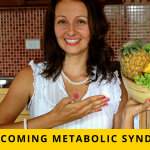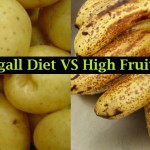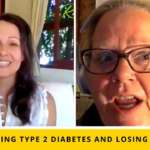Do you really need to worry about your LDL cholesterol levels (also known as bad cholesterol)?
Or is the subject just totally overblown and not worth worrying about?
High fat diet promoters who follow diets like Keto and Paleo typically go with the idea that elevated blood LDL cholesterol levels aren’t something that you should be too concerned about.
They can say that for as long as you eat what they believe is a “healthy diet” with lots of animal foods in it and lead an overall healthy lifestyle, you should not really be too concerned about your LDL cholesterol levels.
But is this a good idea to ignore elevated blood lipid levels?
Does having too much LDL cholesterol in your blood actually put you at greater risk of suffering from heart disease, a heart attack and even death?
Discover it all in this article and video!
What is cholesterol
Cholesterol is a waxy substance found naturally in the blood and is predominantly made by the liver. It plays an essential role in making every cell of your body work and is needed to make hormones, vitamin D and bile for digestion.
Cholesterol can also be found in animal products as well, including meat, dairy, eggs and fish.
Symptoms of high cholesterol
High cholesterol has no symptoms and a blood test is the only way to check whether or not your blood cholesterol levels are high. Having high cholesterol levels puts you at risk of suffering from serious health conditions such as:
- Chest pain. Caused by plaque build-up in your coronary arteries and also known as atherosclerosis.
- Heart attack. Caused by a blood clot formed from ruptured arterial plaque.
- Stroke. Caused by a blood clot formed from ruptured arterial plaque, blocking blood flow to the brain.
The truth about LDL cholesterol
I think most of us know friends or relatives who eat a Standard Western Diet and who have suffered with cardiovascular disease, had a heart attack, stroke or even died.
Yes, diet has a huge part to play in the prevention of America’s number 1 killer – which is heart disease.
The really scary thing is that heart disease can potentially start as early as when you’re a baby in your mother’s womb!
In an Italian study it was found that mothers with high LDL cholesterol levels were more likely to have fetuses that had arterial lesions (heart disease).
In fact, studies have shown that by the age of 10 nearly all American children had developed fatty streaks in their arteries, which is the first stage of atherosclerosis (or heart disease).
William C. Roberts — the editor in chief of the American Journal of Cardiology for more than 30 years said that:
The only critical risk factor for atherosclerotic plaque build up is elevated cholesterol levels and, specifically, elevated LDL cholesterol levels in your blood. (1)
Eating cholesterol and saturated fat raises cholesterol levels in the blood
If you do some research on LDL cholesterol levels and people who eat a diet high in animal fats, like the Paleo and Keto diets, you’ll soon read about many people struggling with elevated LDL cholesterol levels.
And you’ll discover that people who follow and promote such diets come up with all sorts of reasons why you should not worry about having higher LDL cholesterol levels.
In fact, they can tell you that it’s not even the total LDL count that matters.
Why paleo and keto promoters are incorrect about cholesterol
One of their favourite arguments is that when it comes to LDL cholesterol, it’s the types of particles that you have that make up your LDL cholesterol that matters.
There are 2 types of particles that make up your LDL cholesterol:
- Large fluffy particles,
- And smaller, denser particles.
The issue here is that promoters and followers of high fat animal diets, like keto and paleo, often state that as long as you have more of the larger fluffy particles than the smaller dense ones in your blood, then you don’t need to worry about your levels.
They say that the smaller, denser particles are the ones that cause the real damage to your arteries and can lead to atherosclerosis (heart disease and even death), rather than larger, fluffier ones.
But is this notion actually based on hard scientific facts?
Well, there was a study that was done on women and it found that the smaller and more dense LDL particles are a health risk and raise your risk of heart disease by 63%.
They also discovered that the larger, fluffier particles still raise your risk of heart disease by 44%.
And another study, this time done on men, found similar results with a 31% increased risk of heart attack or death from the larger LDL particles and a 44% increase from the smaller, dense LDL particles.
So in truth whatever way you cut it, LDL particles – both big and small – are a significant risk factor when it comes to heart disease.
In fact, a review that was published in the Journal of The American College Of Cardiology on this very topic stated that:
“Cholesterol, largely transported through the body as LDL-C, has clearly been established as a causal agent in atherosclerosis over many decades of extensive research. Regardless of size, LDL particles are atherogenic.”
Cholesterol diet
So knowing this, what diet can you adopt and how can you naturally lower it without medication?
Well, it is almost certainly not going to happen if your diet is full of saturated fats and trans fats.
This means the consumption of oils, meats, butter, lard or eggs in your diet – which are the standard fare for the Paleo and animal based Keto diets.
Instead, you need to adopt a high-carbohydrate, whole foods, plant-based plan.
A dietary review of 49 observational and controlled studies found plant-based vegetarian diets, especially vegan diets, are associated with lower levels of total cholesterol, including lower levels of HDL and LDL cholesterol, compared to omnivorous diets.
One study noted how people who were given a 20 servings of fruit a day diet for several weeks achieved an amazing 38 point drop in their LDL cholesterol levels.
In fact, a vegan diet that is full of whole plant foods and low in healthy fats has been scientifically proven to not only stop heart disease, but actually reverse it.
Dr Caldwell Esselstyn carried out a study which proved that a whole plant foods vegan diet, that contains healthy whole food fats, in modest amounts can actually reverse heart disease.
Understanding cholesterol levels
Here are the general guidelines:
- Optimal if it is less than 100.
- Near optimal/above optimal if it is 100-129.
- Borderline high if it is 130-159.
- High if it is 160-189.
- Very high if it is 190 or above.
Even though an LDL level of 100mg/dl or less is considered optimal by the mainstream medical establishment, it has been shown that a truly ideal total level is probably 50 or 70mg/dl and apparently the lower the better.
This is where we start out at birth and these are the levels seen in populations largely free of heart disease. (2)
And guess what?
Getting your LDL total down to around 70 mg/dl or less is definitely achievable for many people on a high-carbohydrate, whole foods plant diet.
In fact, over the last 6 years of us coaching people from all over the world, we’ve helped people lower their cholesterol levels completely naturally and get off their medications.
So when it comes to achieving a truly healthy LDL level and protecting yourself and your children from heart disease, the science clearly shows us that a high-carbohydrate, whole plant foods diet is the ideal.
Ready for your big health leap?
We’re excited to invite you to our FREE online masterclass.
During our training, we’ll walk you through the 5 steps our clients use to overcome ongoing health conditions and drop 10-50 lbs of extra weight … whilst never restricting themselves of carbohydrates and sugar.
Don’t miss out, claim your spot here!
Sources:
- https://www.ncbi.nlm.nih.gov/pmc/articles/PMC3603726/
- 28 O’Keefe JH, Cordain L, Harris WH, Moe RM, Vogel R. Optimal low-density lipoprotein is 50 to 70 mg/ dl: lower is better and physiologically normal. J Am Coll Cardiol. 2004;43( 11): 2142–









I am sorry if it wasn’t clear. I meant people in those studies are on SAD or similar but not on keto. Rawsomehealthy is one-sided, I consider to unsubscribe. IMO many people can do well on either diets just don’t mix the two ( =SAD). Cholesterol is not a problem by its own but the circumstances make different. High carb + cholesterol is bad. Check out those channels I’ve mentioned above. Eye-openers if you are open-minded. Good luck to find what’s the Best for You.
The bottom line is having a high LDL cholesterol level is putting the person at a higher risk of serious health problems no matter what their diet is. For example I have never heard an expert like for example, William C. Roberts — the editor in chief of the American Journal of Cardiology, ever say that your high LDL Cholesterol only matters if you are on a SAD diet and is just fine if on Paleo or Keto. Our bodies don’t care what labels we attach to our diets, if what we eat causes an unhealthy increase in our LDL-C then we should be activley doing something to lower it if we really value our health.
AFAIK the Ratio between HDL and Triglycerides matters. It can be good on a HCLF diet because there are low/no fats. It can be good on keto regardless of the amount of fat present in a meal. Or it can be bad when carbs and fats are present even if there are less fats in that meal. ( =SAD)
William C. Roberts — the editor in chief of the American Journal of Cardiology for more than 30 years said quote: “The only critical risk factor for atherosclerotic plaque build up is elevated cholesterol levels and, specifically, elevated LDL cholesterol levels in your blood”. Does not matter what diet this happens with its a significant risk factor. Experts such as William C. Roberts do not single out any particular diet when it comes to this very important point. Elevated levels of LDL – C are not good on any diet.
Who do you even want to be on a ketogenic diet? It makes your body so acidic that you get various health problems, and even puts you at huge risk of developing serious illnesses like cancer, heart disease and so on. Everything you eat will only end up partially digested, leaving huge bits of waste rotting in your colon, making your body further more acidic and puts you at risk for MORE diseases. Why do you want to do that with your body? AND – why do you wan’t to put your body in survival mode? That’s all it replicates. It has NOTHING to do with health.